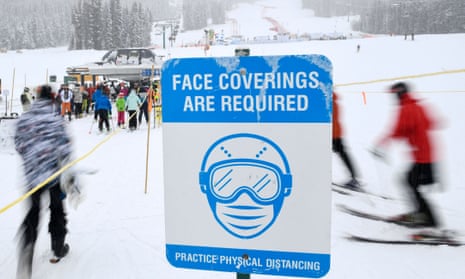That’s it from me, Samantha Lock, reporting from Sydney, Australia.
Thanks for following along – this blog is now closed. You can catch up with the latest coronavirus coverage on our new blog here.
All over-18s in UK will be offered third jab in response to new variant now also recorded in Spain, Sweden and Canada

That’s it from me, Samantha Lock, reporting from Sydney, Australia.
Thanks for following along – this blog is now closed. You can catch up with the latest coronavirus coverage on our new blog here.
As Europe braces for a possible outbreak of the new Omicron coronavirus variant, here is a quick visual refresh of where the continent stands in its fight against the coronavirus.
This updated map indicates incidence rates across Europe.
South Africa reported 2,273 new Covid-19 cases and 25 deaths in the past 24 hours, according to National Department of Health data.
A total of 21,302 tests were conducted with the 2,273 new cases representing a 10.7% positivity rate.
#COVID19 UPDATE: A total of 21,302 tests were conducted in the last 24hrs, with 2,273 new cases, which represents a 10.7% positivity rate. A further 25 #COVID19 related deaths have been reported, bringing total fatalities to 89,822 to date. See more here: https://t.co/YG74RzR3kH pic.twitter.com/I1c08llnaT
— NICD (@nicd_sa) November 29, 2021
President Rodrigo Duterte of the Philippines said he favours mandatory vaccination against Covid should the government’s Covid-19 task force recommend the policy.
“As a worker of government also in charge of the overall operations of the government, I may agree with the task force [Inter-Agency Task Force for the Management of Emerging Infectious Diseases] if they decide to make it mandatory. It’s for public health,” Duterte said in a televised meeting with the National Task Force (NTF) against Covid-19 and medical experts in Malacañan Palace.
He acknowledged that a law is needed to mandate Filipinos to receive the Covid-19 vaccine shots, but reiterated that government can also use its police power to compel citizens to get vaccinated against Covid-19, the Philippine News Agency reports.

Ministers are set to ramp up vaccinations to 3.5m a week as the minimum gap for boosters was cut to three months.
Confirmed Omicron cases rose to 11 in England and Scotland on Monday, with scientific advisers braced for hundreds more to be detected in the next week or so.
From Tuesday, masks will be mandatory on public transport including airports and stations and in shops – including hair salons and takeaways but not pubs or restaurants.
The NHS is set to confirm an expansion of the vaccine programme this week.
Read the full story here.
Hi everyone, it’s Samantha Lock here, ready to take you through all the Covid news.
Let’s start off with some updates out of Australia.
NSW and Victoria have reported their Covid data for the day. Victoria records 917 Covid cases and six deaths and NSW records 179 cases and three deaths.
There are five cases of the new Omicron confirmed in the country – all are in quarantine.
There are four in Sydney (after two more were confirmed late yesterday) and one in the Northern Territory.
All five people had been vaccinated.
Anthony Fauci, the top infectious disease official of the US, told CNN on Monday it could not yet be predicted if the Omicron Covid-19 variant will become the dominant variant in the country.
Fauci also reiterated that the US was unlikely to impose further travel restrictions.
The mayor of New York City, Bill de Blasio, has urged New Yorkers to take up vaccine and booster offers and wear face masks, while claiming that there are currently zero cases of Omicron in the city.
We're closely monitoring the #OmicronVariant. While there are currently NO cases in our city, it's not a matter of if it gets here, it's a matter of when.
— Mayor Bill de Blasio (@NYCMayor) November 29, 2021
Now's the time to double down on what works: vaccines, boosters and masks: https://t.co/cNSZQW3Wf1
Acccording to the New York Times, de Blasio said on Monday that he was emphasising the city health department’s standing advice that unvaccinated as well as vaccinated New Yorkers wear masks in public indoor settings, although he has has so far not made them mandatory in all indoor public spaces.
“We’re doubling down on it, basically,” de Blasio said. “It’s time to re-up that advisory and make it very, very clear this is a smart thing to do at this point.”
Masks are already required on mass transit and in hospitals and schools. The mayor said the rules for indoor dining would remain unchanged, with vaccinations required for guests, and that planned New Year’s Eve celebrations in Times Square would not be cancelled.
The Omicron Covid-19 variant could hurt global growth prospects while also pushing prices higher, rating agencies Fitch Ratings and Moody’s Investors Service said on Monday, after the World Health Organization said the variant carried a very high risk of infection surges.
“The Omicron variant poses risks to global growth and inflation, especially as it comes during a period of already stretched supply chains, elevated inflation and labour market shortages,” Elena Duggar, associate managing director at Moody’s, told Reuters.
The variant is also likely to hit demand during the upcoming holiday travel and spending season, according to Duggar.
“If the new variant affects global market risk appetite, it would cause further financial stress for debt issuers with large financing needs. For example, emerging market countries that rely on international market borrowing may face heightened refinancing risks,” she said.
Fitch Ratings said separately that it was too soon to incorporate the effects of the Omicron coronavirus variant into its economic growth forecasts until more is known about its transmissibility and severity.
“We currently believe that another large, synchronised global downturn, such as that seen in the first half of 2020, is highly unlikely but the rise in inflation will complicate macroeconomic responses if the new variant takes hold,” Fitch said.
More countries closed borders on Monday, casting a shadow over economic recovery from the two-year pandemic. Big airlines acted swiftly to protect their hubs by curbing passenger travel from southern Africa, fearing that a spread of the new variant would trigger restrictions from other destinations beyond the immediately affected regions, industry sources said.
The experience with past variants suggests that, even with some restrictions on international travel, the spread of the Omicron variant may be hard to stop, Duggar said, adding: “Should the new variant lead to another rising wave of Covid infections, the hardest-hit economies will be those with lower vaccination rates, higher dependence on tourism and lower capacity to offer fiscal and monetary policy support to offset the growth impact of the new wave of infections.”
Cuba will tighten coronavirus restrictions from 4 December for passengers from certain African countries over concerns about the Omicron coronavirus variant, the country’s government said on Monday.
This from Reuters:
Travellers arriving from South Africa, Botswana, Lesotho, Eswatini, Zimbabwe, Namibia, Malawi, and Mozambique will be allowed to enter Cuba, the country’s health ministry said, but will be required to comply with multiple precautionary measures, including proof of vaccination, three PCR tests and a seven-day quarantine.
Travellers from other sub-Saharan African nations, as well as Belgium, Israel, Hong Kong, Egypt and Turkey will be required to take two PCR tests, the ministry said.
Concerns over the Omicron variant are flaring in Cuba just two weeks after the Caribbean island nation reopened its borders to international visitors.
Cuba, whose economy depends on tourism, eased entry requirements after inoculating most of its people with a Covid-19 vaccine developed domestically. New infections have dropped off sharply in recent weeks, as have deaths from Covid-19.
As part of targeted measures to prevent the spread of the new Covid-19 variant Omicron, from 4am on 30 November, people in England will be required by law to wear a face covering in shops, enclosed shopping centres, banks, post offices, and on public transport.
Some individuals will be exempt from doing so, such as children under the age of 11, shop and public transport staff, police officers and emergency responders, plus anyone with a reasonable excuse, such as a disability or physical or mental illness.
People will not be required to wear masks in hospitality settings, and photography studios are also exempt.
People who are not wearing a face covering where they have to can be fined in form of a fixed penalty notice and ordered to pay £200, rising to £400 for the second such offence, £800 for the third, up to a maximum of £6,400 for a sixth or subsequent fixed penalty notice.